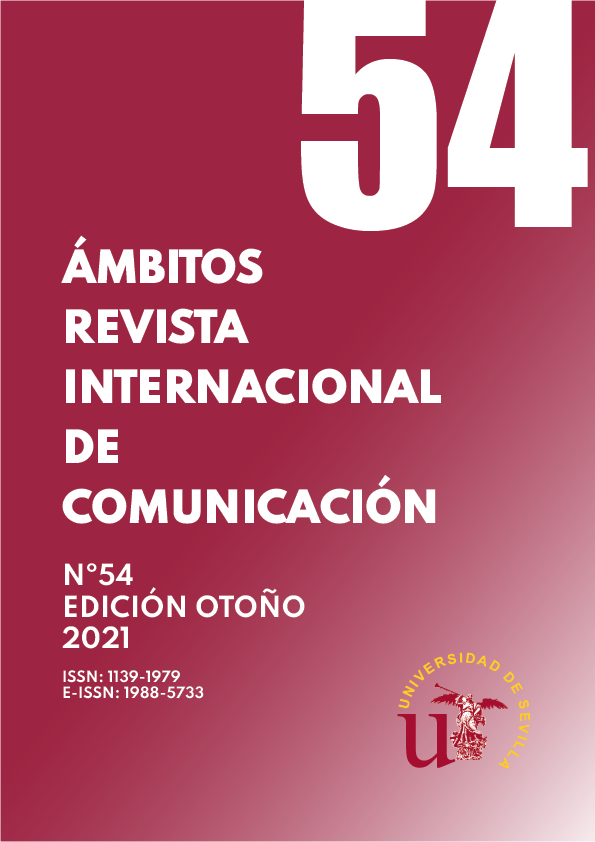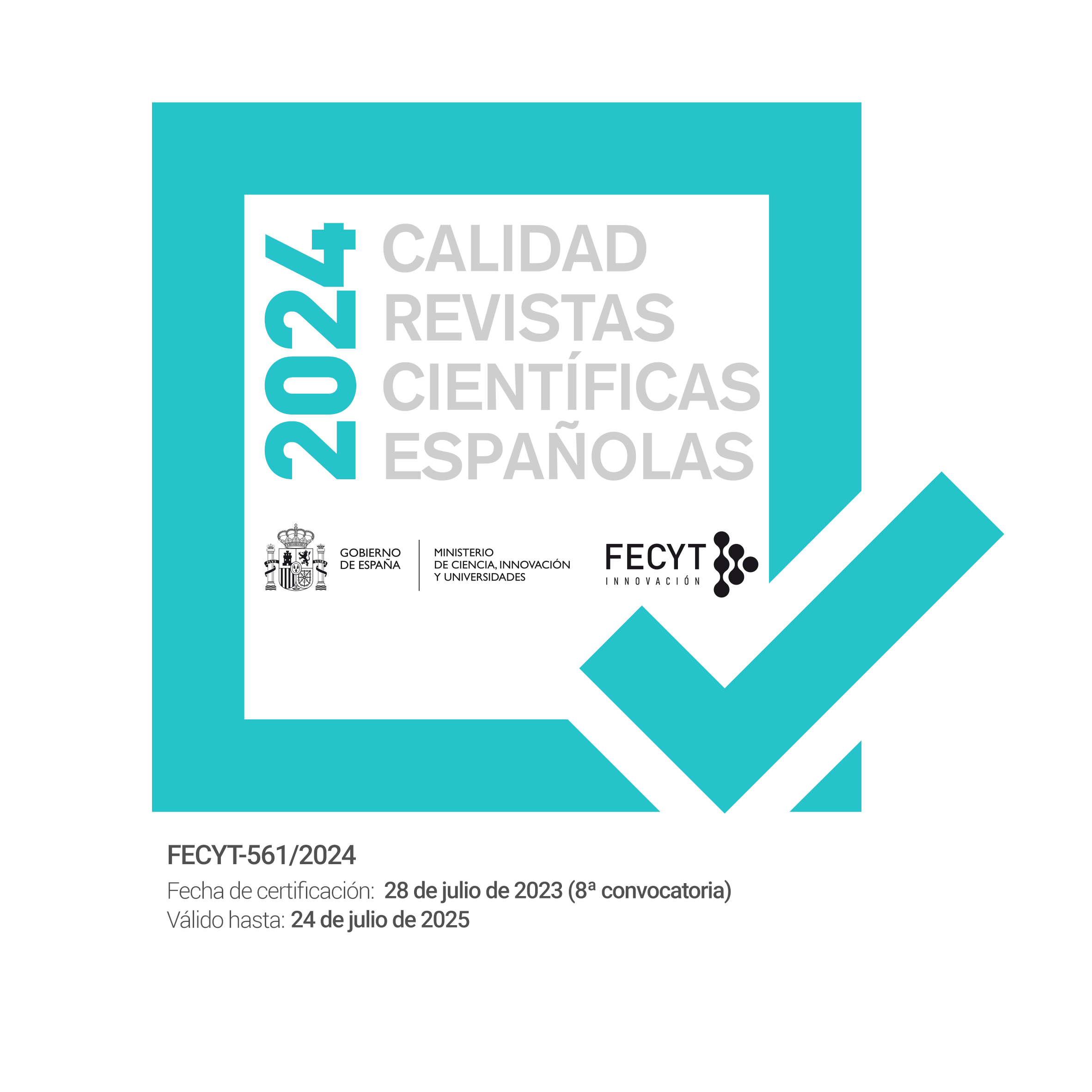El posicionamiento de La Voz de Galicia durante la guerra civil española (1936-1939)
DOI:
https://doi.org/10.12795/Ambitos.2021.i54.03Palabras clave:
Guerra Civil, periodismo literario, La Voz de Galicia, ideologíaResumen
En los años anteriores a la guerra civil española, el diario coruñés La Voz de Galicia orientó sus contenidos siguiendo las indicaciones precisas que recibía de la dirección de prensa y propaganda y de los sucesivos organismos que le sucedieron. Las autoridades militares y civiles intervinieron durante aquellos años en el nombramiento de personas del consejo de administración, de directores del periódico y, de manera delegada a través de estos, del personal de la redacción. Sin embargo, la propiedad jurídica de la empresa permaneció siempre en poder de sus legítimos propietarios. La Voz de Galicia prefería poner en boca de otros sus preferencias y sus discrepancias con las iniciativas gubernamentales (AUTOR). El objeto principal era mostrar que el periódico tomó sus medidas para incluir únicamente voces que resultaran afines al cometido común de ganar la guerra, buscando como todos apoyar al bando nacional. El artículo aborda con una metodología descriptiva y analítica el procedimiento de selección de los periodistas que cubrieron la información en aquel difícil período y muestra cómo el punto de vista de fuentes externas era considerado inevitablemente sesgado. De la misma manera, proporciona datos sobre el contexto en que se vivió el conflicto, tratando de mantener la fidelidad a los principios fundacionales del periódico.
Descargas
Métricas
Citas
Altabella, J. y Leal, F. (1965). Faro de Vigo y su proyección histórica. Editora Nacional.
Blanco, L. El Correo Gallego: Cien años de aportación a la historia 1878-1978. Ed. Compostela
Colección de La Voz de Galicia 1930-1939. Ejemplares consultados en papel en el archivo de La Voz de Galicia. https://www.lavozdegalicia.es/hemeroteca/
Fernández, C. (1993). EL Ideal Gallego 75 años de historia (1917-1992). Ediciós do Castro.
Fernández, C. (1993). La Voz de Galicia. Crónica de un periódico (1882-1992). Ediciós do Castro.
García González, A. (2009). Historia de la empresa “La Voz de Galicia” (1939-1992). LibrosenRed
García González, A. (2002). “La voz de Galicia y el régimen de censura y de consignas” en García Galindo, J.A.; Gutiérrez Lozan, F. y Sánchez Alarcón I. La comunicación social durante el franquismo. CEDMA.
Iglesias, F. (1980): Historia de una empresa periodística. Prensa Española. Editora de ABC y Blanco y Negro (1891-1978). Ed. Prensa Española.
Libro de Actas del Consejo de Administración de La Voz de Galicia S.A. Fuentes archivísticas.- Consejo de Gobierno y administración. 1930-1939. Documentos conservados en el archivo de la empresa. Puestos a disposición de las autoras. Inéditos.
Memorias de accionistas de La Voz de Galicia. Fuentes archivísticas. 1930-1939. Documentos conservados en el archivo de la empresa. Puestos a disposición de las autoras. Inéditos.
Documentos conservados en el archivo de la empresa. Puestos a disposición de las autoras. Sin publicar.
Payne, Stanley G. (2017). En defensa de España: desmontando mitos y leyendas negras. Espasa
Redondo, G. (1970). Las empresas políticas de José Ortega y Gasset. El Sol, Crisol y Luz (1917-1934). Rialp.
Román Portas, M. (1997). Historia de La voz de Galicia. Servicio de Publicaciones Universidad de Vigo.
Sánchez, A. (1989). El Correo Español-El Pueblo Vasco y su entorno informativo (1910-1985). Ed. Servicio de Publicaciones de la Universidad de Navarra.
Sánchez, J.J. (1983). Navarra en 1900: los comienzos del Diario. Ediciones y Libros.
Sinova, J. (1989). La censura de prensa durante el franquismo. Espasa Calpe.
Valladares, E. (1993). Historia de una empresa periodística gallega: La Región. Ed. Universidad Complutense de Madrid.
Descargas
Publicado
Cómo citar
Número
Sección
Licencia
Derechos de autor 2021 Mercedes Román Portas, Aurora García González, Lourdes Román Portas

Esta obra está bajo una licencia internacional Creative Commons Atribución-NoComercial-CompartirIgual 4.0.
Ámbitos. Revista Internacional de Comunicación es una revista de acceso abierto, lo que significa que todo su contenido está disponible gratuitamente para el usuario o su institución. Los usuarios pueden leer, descargar, copiar, distribuir, imprimir, buscar o enlazar con el texto completo de los artículos, o utilizarlos para cualquier otro fin lícito, sin solicitar permiso previo al editor o al autor. Esta definición de acceso abierto se ajusta a la Iniciativa de Acceso Abierto de Budapest (BOAI).

A menos que se indique lo contrario, todo el contenido de la edición electrónica se distribuye bajo una " licencia internacional Creative Commons Attribution-NonCommercial-ShareAlike 4.0 ". Puede consultar la versión informativa y el texto legal de la licencia aquí. Esto debe indicarse expresamente de esta manera cuando sea necesario.
En caso de aceptación del manuscrito, los autores ceden los derechos de la obra para su publicación a Ámbitos. Revista Internacional de Comunicación bajo el contrato de licencia Reconocimiento-NoComercial-CompartirIgual 4.0 Internacional (CC BY-NC-SA 4.0). Los autores conservan los derechos de autor y terceros están autorizados a copiar, distribuir y hacer uso de la obra, siempre que cumplan con los términos y condiciones establecidos en la licencia.
- Citar la autoría y la fuente original de publicación (revista, editorial y URL de la obra).
- No los utilice con fines comerciales.
- Si remezcla, transforma o crea a partir del material, debe publicar sus contribuciones bajo la misma licencia que el original.
Se puede encontrar más información en https://creativecommons.org/licenses/by-nc-sa/4.0/deed.es
- Resumen 1759
- pdf 590



















